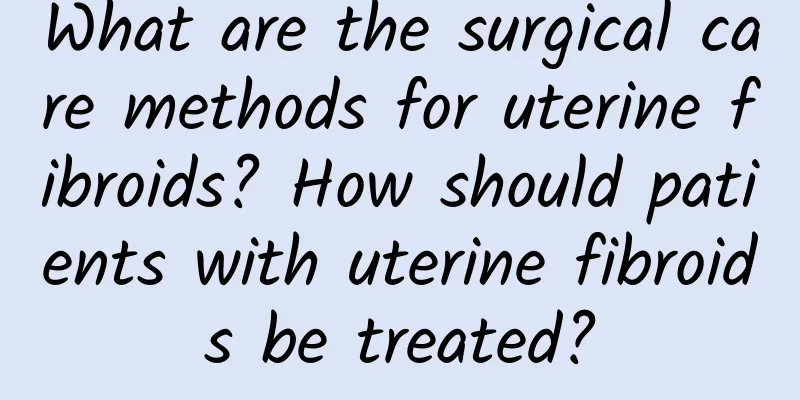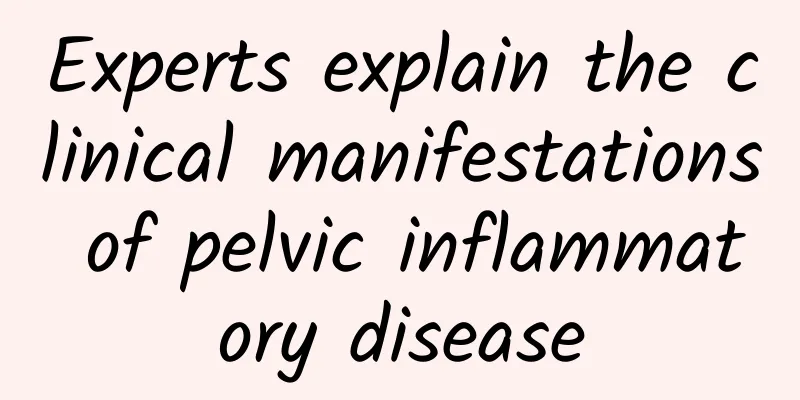What are the surgical care methods for uterine fibroids? How should patients with uterine fibroids be treated?

|
Uterine fibroids are prone to recurrence. If the postoperative care is not done properly, it is possible to get it again. Therefore, learning how to deal with the postoperative period is key. So what should be paid attention to in the surgical care of uterine fibroids? 1. Preoperative care: Psychological care: Explain to the patient the importance and precautions of surgical treatment, surgical treatment methods and anesthesia methods, and provide guidance based on the patient's different psychological reactions to eliminate the patient's fear of surgery and postoperative concerns. Preoperative preparation: Vaginal preparation before uterine fibroid surgery is crucial to prevent postoperative infection. The more thorough the preoperative vaginal preparation, the less chance of postoperative infection. 2. Postoperative care: Post-anesthesia care: After returning to the ward, the patient should lie flat on a pillow for 6 to 8 hours with the head tilted to one side to prevent vomitus from being inhaled into the trachea causing suffocation or aspiration pneumonia. Pay attention to observation to prevent accidents. Postoperative observation: After the patient returns to the ward, understand the anesthesia method and surgical conditions, closely observe vital signs, monitor blood oxygen saturation, measure normal blood pressure, respiration, pulse and body temperature every 30 minutes; pay attention to whether the wound dressing is dry, whether there is bleeding, oozing, vaginal bleeding and internal bleeding Body position: Take a semi-recumbent position 24 hours after surgery to relax the abdominal muscles, reduce incision tension, relieve wound pain, and facilitate incision healing. To prevent bleeding from the surgical site or internal bleeding, the time to get up can be appropriately extended after surgery to promote gastrointestinal peristalsis recovery and increase appetite. Pay attention to vaginal bleeding. Diet: A reasonable and appropriate diet after surgery can promote incision healing and physical recovery. When you cannot eat or eat insufficiently, you should supplement intravenously to prevent electrolyte disorders. |
Recommend
Does abortion hurt? What are the precautions to take?
Whether an abortion is painful or not mainly depe...
How can women with irregular menstruation regulate their menstruation? Five criteria to judge whether menstruation is normal
Many female friends do not have a correct underst...
A girl with a thick waist and a small belly may suffer from gastrointestinal crisis caused by three highs
Are you the spokesperson for "thick-waisted ...
How to use medicine after abortion
How to use medicine after abortion? Nowadays, abo...
Find the fault with fat! 6 Teas to Help You Lose Weight
Most teas can promote digestion and increase gast...
Anti-American beef voices are boiling, and the fan group will launch a protest
After the Ma government "planned" to op...
What medicine should elderly people take for uterine fibroids? What are the symptoms of uterine fibroids in the elderly?
What medicine should elderly people take for uter...
The main reasons for the occurrence of uterine fibroids
Among the many gynecological diseases, uterine fi...
How to take good care of your body after abortion
How to keep healthy after an abortion? Abortion i...
Ovarian tumors also often occur in teenage girls
Do you know who are the most susceptible to ovari...
Can pelvic inflammatory disease cause miscarriage? Usually not
What women fear most after becoming pregnant is m...
How should women take care of themselves after abortion? Women should pay attention to these matters after abortion
Sometimes when there is not enough time or money ...
Tell you about the symptoms of acute pelvic inflammatory disease
Pelvic inflammatory disease is also a type of fem...
Introduction to the classification of several common ovarian cysts
Before treating ovarian cysts, you should first d...
What are the dietary therapies for cervical erosion in women? Three points to note in women's diet for cervical erosion
The problem of cervical erosion is a big problem ...









